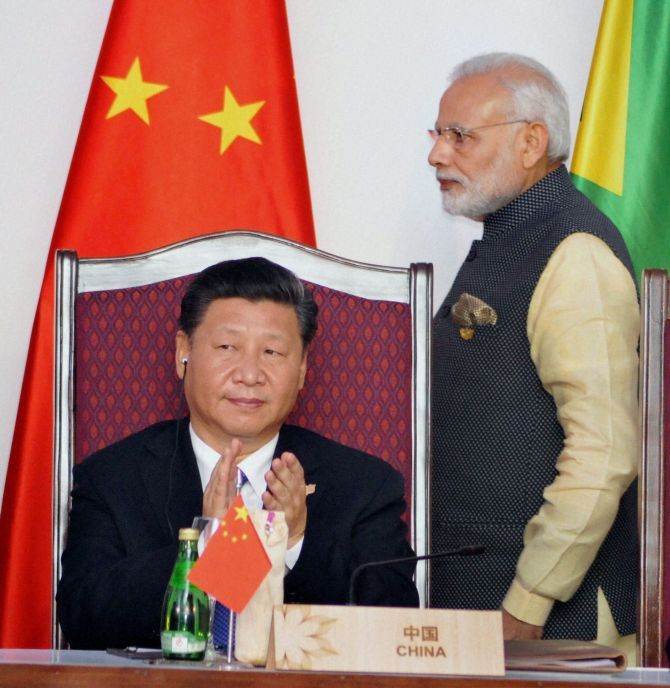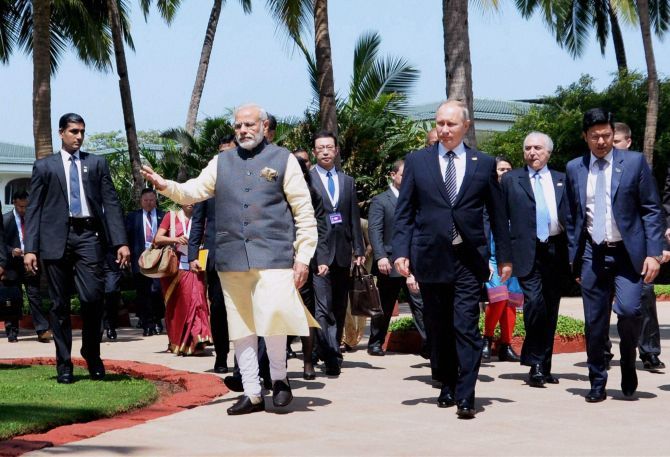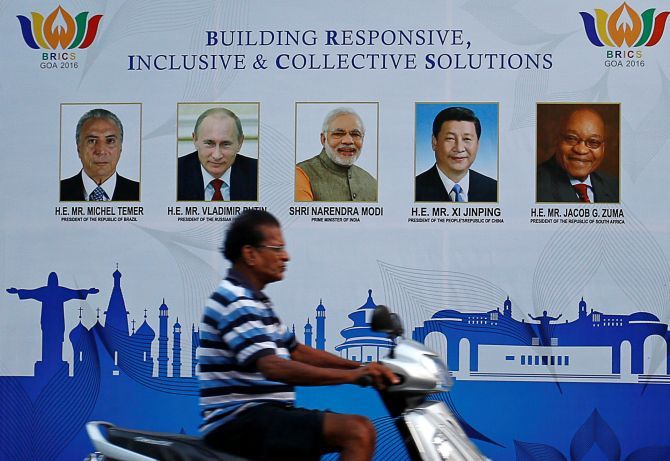
China continues to hold out on fingering Pakistan as the 'mothership of terror,' declaring Masood Azhar a terrorist at the UN, and India's membership of the NSG, says China expert Srikanth Kondapalli.
The BRICS (Brazil, Russia, India, China, South Africa) summit brought together the leaders of India and China once again to exchange views and chart out their global and regional interactions, but also address some of the bilateral relations.
After their first encounter at the Fortaleza meeting of BRICS in July 2014, Prime Minister Narendra Modi met President Xi Jinping for the 9th time at the Goa summit.
Naturally, they underlined the necessity for exchanges between the two leaders for bridging bilateral differences as well as expanding the scope for cooperation.
While there were several intangible outcomes of the Goa meeting, more concrete are the three MoUs signed on agricultural research platform, cooperation between diplomatic academies and between customs of the BRICS countries. On the much anticipated credit ratings agency to monitor the health of the BRICS economies, the declaration only suggested to its 'possibility.'
The 109 points issued at Goa on October 16, in a declaration of over 7,000 words, is perhaps the longest in the BRICS aspirational agenda for the coming year. India's main current concern on terrorism has been highlighted at the summit, although Pakistan was not penalised directly, ostensibly at China's behest.
In the light of the Permanent Court of Arbitration verdict of July 12 on the South China Sea islands dispute, which slammed China's construct of 'nine-dashed line,' the Goa declaration's repeated injunctions on following the international law in the conduct of nations is significant.
Also noticeable were the Indian push for accountability of nations in international affairs, rule of law, the World Trade Organisation's dispute resolution in fair trade practices and the like.

While China's continuing 'technical hold' at the United Nations Security Council committee on Pakistan-based terrorists has disturbed confidence in the bilateral relations with India, the Goa Declaration was unequivocal on condemning terrorist incidents including the recent Uri attack.
The Declaration identified Islamic State and Jabhat al-Nusra in whose ranks thousands of Uighurs from Xinjiang, China, have reportedly joined.
Another disappointment for India is the Chinese intransigence on the Nuclear Supplies Group membership. China had earlier this year stuck to its position that India needs to sign the nuclear Non-Proliferation Treaty and other arms control treaties which New Delhi termed as discriminatory.
Nevertheless, in signs of incremental improvement and leeway in negotiations, the Goa Declaration endorsed 'predictability in accessing technology and finance' for civil nuclear energy projects of the BRICS countries.
Also, since the days of Yekaterinburg in 2009, Russian and more significantly the Chinese position on United Nations Security Council reform and reorganisation has not even witnessed incremental improvement but frozen in their stance that they 'support (Brazil, South Africa and India's) aspiration to play a greater role in the UN.'
This suggests that China has been insisting on endorsing its positions or interests by the aspirant countries.
The Goa Declaration also exhibited to differences and some commonalities among BRICS States on the issue of global commons, mainly in the maritime, cyber and space domains.
For instance, in the light of the Edward Snowden incident but also restrictions imposed by China and partly by Russia on cyber domains, the declaration supported an 'Open, non-fragmented and secure Internet.'
Clearly, democratic opinions from India, Brazil and South Africa had an upper hand on these issues.
On outer space, the Goa summit advocated peaceful uses and 'no first placement' of weapons. This is against the backdrop of several countries, including the United States, Russia and China having initiated measures for outer space weaponisation, including anti-satellite tests, lasers etc.

For China's part in the deliberations, its national concerns played a bigger role.
While China is making moves away from an export-oriented economy to domestic consumption and away from its dependence on developed markets to exploring developing markets such as some among the BRICS, the way so far has not been smooth.
The 'new normal' economy of declining growth rates from over 12 per cent in 2007 have fallen to less than seven in 2015.
Brewing domestic economic turmoil threatens to derail several initiatives of the Chinese leadership.
Hence, President Xi Jinping, in his speeches at the business council and other interventions, highlighted the necessity for generating confidence in the BRICS initiative, although Brazil, South Africa and Russia have suffered negative or slow growths in the last two years following slump in commodity prices, exports and currency devaluations.
While noting to 'treacherous recovery' of the BRICS countries from the global financial crisis, Xi suggested innovation as a way out of the quagmire. China had experimented with this path in the just concluded 12th Five Year Plan and continues to emphasise in the current 13th Plan as a panacea for the looming crisis.
Xi also suggested that it is now time for action oriented programmes for the BRICS leaders and make some concrete initiatives for its further growth.
While China hinted at a free trade area for the BRICS grouping, which witnessed low intra-BRICS trade at below $300 billion, there are, of course, apprehensions within the BRICS partners on how effectively China opens up its market and implements fair trade practices.
One of the concrete actions of BRICS so far has been the establishment of the New Development Bank which disbursed in April about $911 million in loans for infrastructure projects in the BRICS countries. More such initiatives are likely to follow based on the bank's performance.
Srikanth Kondapalli is Professor in Chinese Studies, Jawaharlal Nehru University, New Delhi.










 © 2025
© 2025